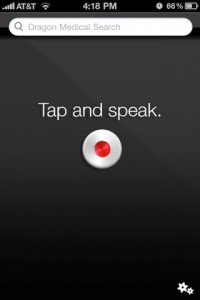 Touchscreen devices will never catch up to the speed of typing on keyboards, but speech recognition technology can help such devices bridge that gap. That's the mindset of Nuance's Jonathon Dreyer, senior manager of mobile solutions marketing at the company's healthcare division:
Touchscreen devices will never catch up to the speed of typing on keyboards, but speech recognition technology can help such devices bridge that gap. That's the mindset of Nuance's Jonathon Dreyer, senior manager of mobile solutions marketing at the company's healthcare division:
"I definitely think voice will be the primary form of input into these mobile devices," Dreyer told MobiHealthNews recently.
Nuance first entered the apps market two years ago with the launch of its Dragon Mobile Medical Search and Dragon Medical Recorder, free applications that were complementary to its desktop products for healthcare. In February, it launched the Nuance Mobile Healthcare Development Platform, a cloud-based service that allows third parties -- software developers at vendor companies as well as hospital providers (internal IT labs at hospitals or provider facilities) -- to rapidly integrate speech recognition into their mobile device or web client. Next year, the service will expand to Europe with 23 additional supported languages.
Dreyer said that its development platform has "pretty good traction" now that it's been about eight months since its launch. More than 100 developers have signed on and around "a couple dozen" Nuance-enabled apps will arrive before the end of the year, Dreyer said. "The biggest thing holding up app developers [for our platform] is approval of their apps [from Apple]," he said. The main types of apps using Nuance are point of care and reference, while other categories include pharma, clinical trials, education programs, patient communications, and disease management apps. Dreyer believes that these categories will eventually change: "These things will morph over time, and we'll see new categories emerge, as well as categories we thought were categories turn out to not be categories."
The vast majority of Nuance-enabled apps are for Apple's iOS devices. "I've seen a growth in the number of Android developers, but it's still significantly less than iOS," Dreyer said. "It might come down to the fact that a significant amount of clinical professionals own [iOS] devices for personal use." However, Dreyer doesn't think Apple's lead in the marketplace is set in stone. "If a company can claim its device is more secure -- that it is more tailored to the market -- it can help them lock in that lead."
"I've read so many reports recently that complain that [medical apps] are unusable," Dreyer said. While adding voice recognition to a medical app may make it a little easier to use, it doesn't necessarily make it a good app.
"If the app sucks, the app sucks," Dreyer said. "There's not too much we can do about it."















